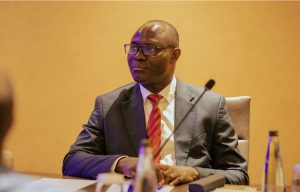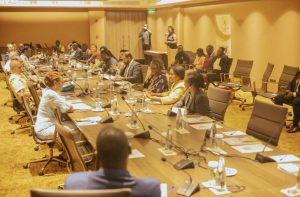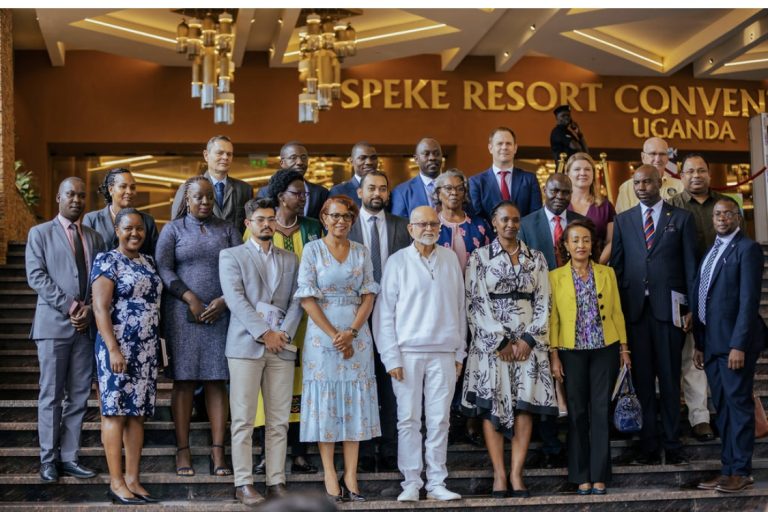The Ministry of Tourism, Wildlife and Antiquities (MTWA), in partnership with the Presidential CEO Forum (PCF), has convened the first-ever Top Tourism Investment Round Table at Speke Resort Munyonyo, ahead of the forthcoming 6th bi annual private sector retreat in Fort Portal.
The high-level engagement brought together 35 key stakeholders, including policymakers, CEOs, investors, development partners, and private sector leaders to chart a new course for positioning Uganda as a premier tourism and investment destination.
The round table discussions generated resounding feedback on how the government can more effectively complement the private sector in unlocking Uganda’s tourism potential. The deliberations centered around infrastructure development, conservation, harmonized tax policies, product diversification, marketing, and enhancing tourist safety.
Speaking on behalf of the State Minister for Tourism, Wildlife and Antiquities, the Director of Tourism, Dr. Basil Ajer, emphasized the urgent need to unlock the sector’s full potential.
“If we are to position Uganda competitively, we must activate the entire tourism value chain,” Dr. Ajer said, adding that Uganda’s return on investment in tourism averages 14 percent, while return on equity ranges between 20–25 percent, making the sector one of the most viable for economic growth.
He pledged to convene an inter-ministerial meeting to harmonize solutions, adding that resolutions from the dialogue would be forwarded to the Office of the Prime Minister.
He added, “This round table marks a turning point in Uganda’s tourism sector. The government remains committed to providing an enabling environment for investors, strengthening partnerships, and accelerating interventions that position Uganda as Africa’s most attractive tourism hub.”

The Executive Director of the National Planning Authority, Dr. Joseph Muvawala, called the current state a “turning point” for Uganda’s economy and tourism.
“Tourism is a crosscutting growth sector that requires synergy. The feedback shared today provides a roadmap for collaboration between government and the private sector to unlock Uganda’s true potential,” Dr, Muvawala said.
He underscored the fiscal constraints the country faces, pointing out that although Uganda’s national budget stands at UGX 72 trillion, only UGX 32 trillion is collected domestically, with the remainder financed through borrowing.
“We have invested in fundamentals, but the fiscal space remains tight—less than UGX 20 trillion is available for development. To change course, the economy must multiply three times in the next five years, growing at about 10 percent annually,” he said.
Dr. Muvawala challenged the private sector to drive this transformation by scaling tourism tenfold in the next 15 years.
“We cannot continue doing business the same way. This sector must become more private-sector driven. The decisions we make in forums like this one will run the country,” he added.

During the meeting, private sector players raised concerns ranging from inaccurate tourism data, underfunded marketing, poor infrastructure, and bureaucratic bottlenecks to weak crisis communication and investment barriers.
Participants called for reforms in tax regimes, better road and air connectivity and more aggressive international branding of Uganda’s “Explore Uganda” campaign.
The discussions in Munyonyo set the stage for the larger Tourism Forum in Fort Portal, where stakeholders are expected to refine actionable commitments to make tourism a leading driver of Uganda’s economic growth.
This inaugural edition also sets the stage for subsequent annual engagements that will ensure continuous feedback, collaboration, and accountability in growing Uganda’s tourism sector.
The meeting was graced by top tourism investors like Marrasa Group, Ruperelia Group, Volcanoes Safaries, Satguru Travel and Tourism, Wild places together as well as government MDA’s including the Ministry of Tourism Wildlife and Antiquities, Ministry of Finance, Planning and Economic Development, Uganda Tourism Board, Uganda Wildlife Authority, National Planning Authority, and Uganda Tourism Association.

